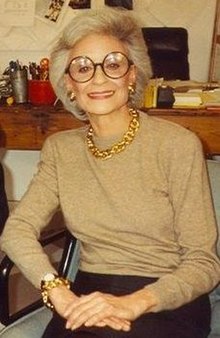This is an old revision of this page, as edited by InsulinRS (talk | contribs) at 21:04, 12 October 2020. The present address (URL) is a permanent link to this revision, which may differ significantly from the current revision.
Revision as of 21:04, 12 October 2020 by InsulinRS (talk | contribs)(diff) ← Previous revision | Latest revision (diff) | Newer revision → (diff)
| Frances Lear | |
|---|---|
 | |
| Born | Evelyn (1923-07-14)July 14, 1923 Hudson, New York |
| Died | September 30, 1996(1996-09-30) (aged 73) Manhattan, New York |
| Occupation(s) | Activist, publisher, editor, writer |
| Known for | Lear's |
| Spouse |
Norman Lear
(m. 1956; div. 1985) |
| Children | 2 |
Frances Lear (née Loeb, July 14, 1923 – September 30, 1996) was an American activist, magazine publisher, editor and writer.
Biography
Lear was born with only a first name Evelyn to an unwed mother in Hudson, New York, at the Vanderheusen Home for Wayward Girls. She was adopted at 14 months by Aline and Herbert Loeb from Larchmont, New York, who changed her name from Evelyn to Frances. When she was 10 years old, her adoptive father committed suicide after losing his business in the Depression. Her mother remarried and when Frances was 12, her stepfather began molesting her, according to her autobiography. She attended the Mary A. Burnham School for Girls in Northampton, Massachusetts.
She was married and divorced twice at a young age, first to Arnold Weiss and secondly to Morton Kaufman (or Kaufmann). In 1956, she married television producer Norman Lear in Las Vegas. At age 50, she was diagnosed with bipolar disorder. She became an activist for the women's movement, civil rights and mental health.
During the 1968 Democratic Presidential Primaries she supported Minnesota Senator Eugene McCarthy bid for President. She later worked with the National Organization for Women on behalf of the Equal Rights Amendment.
In 1985, she divorced Lear after 28 years of marriage. The divorce settlement, estimated to be between $100 million to $112 million, was one of the largest on record. She used $25 million of the settlement to start Lear's, a magazine targeting women over 45. She was Advertising Age Editor of the Year in 1989. The magazine folded six years later.
She was also the inspiration for the character Maude Findlay on the sitcom Maude.Cite error: A <ref> tag is missing the closing </ref> (see the help page).
References
- Gleick, Elizabeth (July 13, 1992). "Frances Lear". People.
- ^ Nemy, Enid (October 1, 1996). "Frances Lear, a Mercurial Figure of the Media and a Magazine Founder, Dead at 73". The New York Times. Retrieved April 24, 2017.
- Wolff, Geoffrey (August 1981). "Shortcuts to the Heart". Esquire. Retrieved April 24, 2017.
- Levy, Claudia; Lev (October 2, 1996). "Publisher Frances Lear Dies". The Washington Post. Retrieved April 24, 2017.
- ^ Cite error: The named reference
maudelearwas invoked but never defined (see the help page). - "Frances Lear Dead at 73". Advertising Age. October 7, 1996. Retrieved April 24, 2017.
- Helmore, Edward (October 4, 1996). "Obituary: Frances Lear". The Independent. Retrieved April 24, 2017.
- "In other news". CNN. October 1, 1996. Retrieved April 24, 2017.
External links
- Frances Lear at IMDb
This biography of an American publisher is a stub. You can help Misplaced Pages by expanding it. |
This biographical article about an activist is a stub. You can help Misplaced Pages by expanding it. |